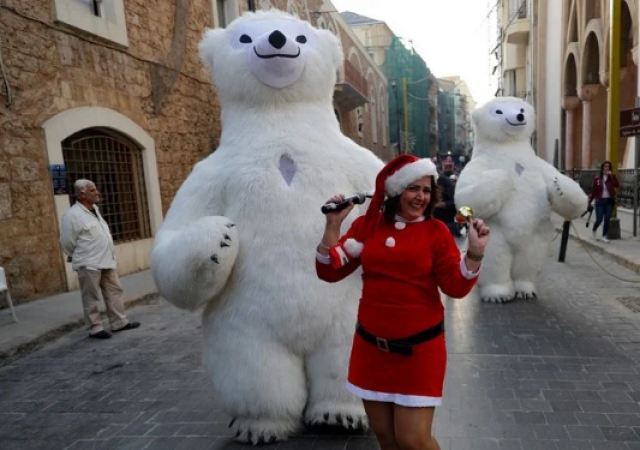
Beirut: The Lebanese are getting ready to celebrate the holidays, but their happiness is limited by their financial situation.
In an effort to brighten the holidays in cities that had been plunged into darkness months earlier, some commercial streets in Beirut and significant coastal cities like Jounieh, Jbeil, and Batroun were decorated with Christmas lights, powered either by solar panels or private electricity generators.
Shopping centres are crowded with people, and it is easy to see the social differences between them. "Some shoppers buy expensive toys without even asking about the price first, while others go around the shop comparing prices and settle for the cheapest ones,"
Also Read: The price of Amazon has dropped to pre-pandemic levels. Time to buy?
In clothing stores, the differences are even more obvious. Luxury stores have very few purchases made, but the less expensive outlet stores, which have gained popularity recently, are crowded with customers.
The majority of shoppers, however, are drawn to supermarkets and grocery stores, where they must make a difficult decision between expensive items and less expensive, locally produced goods of lower quality.
Temporary Christmas markets were set up in public spaces to spread cheer, particularly among kids. According to a visitor who spoke with Arab News, "Such events really get us in the holiday spirit. Being out in such large numbers is pleasant. Although the situation is challenging, we're working to get through it.
A bank employee named Claudine said to Arab News that "everyone is getting ready to celebrate the holidays in their own way. This year, I skipped the Christmas tree decorating. The cost of decorations is too high. Costing between 4,000,001 and 15,001,001 LBP, a Christmas tree is more expensive than my salary. Six ornaments cost at least 500,000 LBP in a pack.
"The cost of Christmas tree decorations has reached 25,000,000 LBP ($545 based on the black market rate of 45,800 LBP/USD)," the owner of a decoration store in Furn El-Chebbak stated.
"Everything depends on the individual's income and purchasing power. For instance, employees in the private sector now receive a portion of their pay in dollars, allowing them to spend more than others.
The Christmas Eve dinner this year is the top priority, May, a teacher and mother of two, told Arab News. No matter the situation, people want to be happy, and whether it's a simple or lavish dinner, the table brings the family together.
Also Read: IDC predicts that global spending on digital transformation will reach $74 billion annually by 2026
Dishes for Christmas cost millions of pounds in Lebanon. A holiday turkey must cost at least $150 (6,870,000 LBP), 250g of cheese must cost at least 300,000 LBP, and the Buche de Noel cake must cost at least 900,000 LBP.
Families have chosen not to exchange pricey gifts like new smartphones and gold jewellery in light of these costs.
Nohad, a Lebanese national, told Arab News that rather than receiving a Christmas gift, she would prefer someone to pay for the cost of her medications.
According to a study on the cost of living conducted by the American University of Beirut this year, "a Lebanese family needs at least five times the minimum wage to secure food."
"People are no longer able to buy fuel for heating, and they may spend the chilly holiday nights wrapped in blankets or burning clothes and shoes in heaters instead of firewood and diesel," Seba, a young woman from the Bekaa region, told Arab News.
Lebanon's level of poverty has increased as a result of the 2019 financial collapse. At least 1.5 million Lebanese live in poverty, surviving on less than $2.15 per day, according to the UN Economic and Social Commission for Western Asia (about 114,000 LBP). Compared to the dollar, the local currency has lost more than 95% of its value.
At Rafic Hariri International Airport in Beirut, dozens of aircraft carrying expatriates who want to celebrate the holidays with their families land every day.
As part of a campaign dubbed "Come Back in Winter" that the ministry launched, Walid Nassar, Lebanon's minister of tourism, had anticipated that about 500,000 expatriates would arrive over the holidays, potentially bringing in up to $2 billion in revenue.
After suffering significant damage in the blast at the Beirut port in August 2020, a number of hotels have recently reopened. The head of the Hotel Owners Syndicate, Pierre Al-Ashqar, predicts a spike in holiday bookings for hotels and ski lodges.
Also Read: Tunisia wants to reduce its fiscal deficit to 5.5% in 2023, with the help of economic reforms
Political differences are still preventing the election of a new president on the administrative front. This has enraged residents who are fed up with the state of affairs, particularly in light of the growing security concerns in a lawless state.
To stop unrest, the Central Security Council has taken action. "The measures include conducting security patrols, setting up checkpoints in different regions, and stationing security forces in front of churches and places of worship," a security source told Arab News.
All of these actions are intended to reassure the public that security is maintained and that everything is under the control of the security services. "About 90% of the military personnel will be on call."
With the help of the Internal Security Forces, the Lebanese Motorcycle Club, the YASA Association, and the Freedom Rider Association organised a holiday traffic safety awareness campaign.